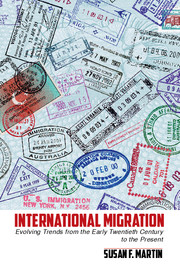Book contents
- Frontmatter
- Contents
- Foreword
- Acknowledgments
- List of Acronyms
- Introduction
- 1 Early Roots
- 2 “The Problem of Refugees”
- 3 Labor Mobility
- 4 Orderly and Humane Migration Management
- 5 Trafficking in Persons
- 6 Migration and International Security
- 7 Migration, the Environment, and Climate Change*
- 8 Migration and Development
- 9 Towards the Future
- Bibliography
- Index
2 - “The Problem of Refugees”
Published online by Cambridge University Press: 05 August 2014
- Frontmatter
- Contents
- Foreword
- Acknowledgments
- List of Acronyms
- Introduction
- 1 Early Roots
- 2 “The Problem of Refugees”
- 3 Labor Mobility
- 4 Orderly and Humane Migration Management
- 5 Trafficking in Persons
- 6 Migration and International Security
- 7 Migration, the Environment, and Climate Change*
- 8 Migration and Development
- 9 Towards the Future
- Bibliography
- Index
Summary
The title of this chapter is drawn from the 1951 UN Convention Relating to the Status of Refugees. The preamble to the convention expresses “the wish that all States, recognizing the social and humanitarian nature of the problem of refugees, will do everything within their power to prevent this problem from becoming a cause of tension between States” (UN Convention 1951). Adopted in the early days of the Cold War, with the memory of the Holocaust and the reality of hundreds of thousands still displaced by World War II, the convention provided normative underpinnings to the work of the UN High Commissioner for Refugees (UNHCR), established in 1950 to protect and find solutions to the problem of European refugees.
At its core, the Refugee Convention substitutes the protection of the international community (in the form of a host government) for that of an unable or unwilling sovereign state. In effect, the UNHCR was to provide alternative protection for those who had been persecuted by their own states, or who could not claim the protection of their states because of a well-founded fear of future persecution. This reasoning is based on the understanding that states produce refugees because they are unwilling or unable to protect their citizens from persecution. In the words of Charles Keely (1996:1057), the international refugee regime is designed to protect the “international system of states that is threatened when states fail to fulfill their proper roles.”
- Type
- Chapter
- Information
- International MigrationEvolving Trends from the Early Twentieth Century to the Present, pp. 58 - 92Publisher: Cambridge University PressPrint publication year: 2014

